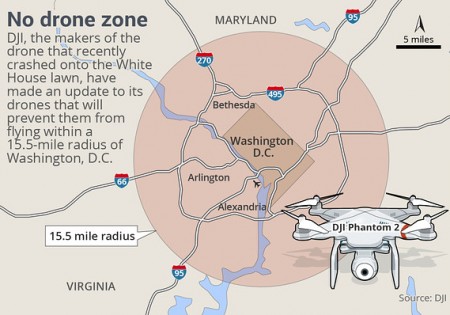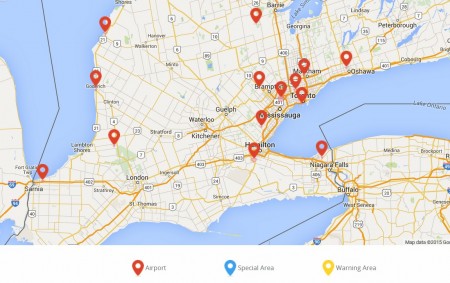November 18, 2015 – DJI is a Chinese manufacturer of drones. In 2013 it began adding software designed to restrict its drones from flying over airports. Further enhancements to the software have created a geofence that restricts its drone models from flying over prisons, power plants, forest fires, airports and even cities considered sensitive to aerial encroachment.
Any area deemed a national security location can be programmed to become a no-fly zone for DJI drones. The company has pre-built a database of geofences. The map below highlights no-fly zones for the Greater Toronto area and Southwestern Ontario.
The company believes that by providing this feature they are anticipating future U.S. Federal Aviation Administration (FAA) flight regulations for drones. Drones are expected to be one of the biggest Christmas sellers in 2015 and according to most recent forecasts are expected to pass the million unit threshold before year end.
The DJI proprietary software in its latest iteration is expected to go live in December. Default drone settings include full restrictions over areas described above. Users, however, can open a DJI account and self-authorize flights disabling the geofencing feature. In such cases DJI advises users that any violation will lead to the company sharing user information with legal and security authorities. Only one zone is not subject to override. That’s the restricted no-fly zone over the American capital. Other drone manufacturers are expected to follow DJI’s lead and several have joined an FAA body tasked with establishing U.S. flight rules for drones.
Some have raised objection to what DJI has done stating that no other technology has prebuilt geofencing. They argue that when you get behind the wheel of an automobile there is nothing limiting you from driving as fast as you like and where you like. It is the obligation of the driver to follow the rules. The argument, however, doesn’t hold water for all vehicles, particularly trucks and buses fitted with governors that cut in when a driver exceeds a predefined speed threshold. And of course autonomous vehicles and collision avoidance and early warning systems are further weakening the argument as more manufacturers take driver “free will” out of the equation.










